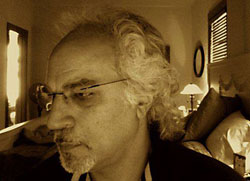 While most dads in the late 1950s ranted and raved against rock ‘n’ roll, Jim Tullio had the unique situation of living under the roof of an accomplished jazz drummer. So when Tullio and his older brother came home with records by Elvis, Bill Haley and Buddy Holly, their old man Nicholas responded like a card sharp upping the ante.
While most dads in the late 1950s ranted and raved against rock ‘n’ roll, Jim Tullio had the unique situation of living under the roof of an accomplished jazz drummer. So when Tullio and his older brother came home with records by Elvis, Bill Haley and Buddy Holly, their old man Nicholas responded like a card sharp upping the ante.
“My dad bought a record, put it down on the table and said, ‘This is what all these guys are trying to do,'” Tullio recalls. “It was by Little Willie John, the guy who wrote ‘Fever.’ Back then it was called race music, and you couldn’t hear it on the radio.”
The child of Italian parents on both sides (his mother Anne and father were both born in Calabria), Tullio took what his dad taught him and parlayed it into a career as an award-winning music producer. His resume reads like a who’s who of popular music, as he’s produced Mavis Staples, Dave Mason and Steve Goodman, and played with Leonard Cohen, Bonnie Raitt and John Prine, to name a few.
It all traces back to his childhood in Atlantic City, N.J., where Tullio caught Levon Helm (whom he would later produce), Todd Rundgren and Bruce Springsteen. Long before stardom called, all those artists played local clubs like Tony Mart’s (where “Eddie and the Cruisers” was filmed, and Tullio gigged himself).
As a teen, Tullio’s father drafted him to play bass alongside him at wedding gigs. It was, Tullio says, incredible to grow up under the watchful eye and sharp ear of a man who hooked up speakers “in every room of the house, even the bathroom… All the kids in the neighborhood hung out with my dad. He played the 500 Club, he played strip clubs, he played weddings, he played everywhere he could.”
Then Tullio discovered The Beatles and the sonic intricacies of “Revolver,” and never looked back. Today, his studio in Evanston boasts an arsenal of vintage microphones and an impressive Neve mixing console. It also ties together everything he’s learned about recording. And keep in mind: This is a guy who formed a record label with Keith Richards of the Rolling Stones.
“I’ve recorded in well over 1,000 studios in my life, and this is the best one I’ve ever recorded in,” says Tullio, 60. “And I got lucky. You don’t know what it’s going to sound like when it’s done. It all comes down to the molecules. You could recreate this exact studio across the street from here, and it wouldn’t sound the same.”
Tullio’s production philosophy may reflect a lifetime of experience as a musician, songwriter and engineer, but sly psychology also informs what he does. “The most valuable attribute for a record producer is attitude,” he says. “It’s all about getting along with people; you can’t make great art when there’s conflict.”
That may explain why to this day, Tullio’s dance card remains full. He’s producing Smashing Pumpkins leader Billy Corgan while he works on music for “Chicagoland,” an eight-part CNN documentary series with Robert Redford as an executive producer. He’s also hard at work on a record by Sam Butler, formerly of the Blind Boys of Alabama, that will feature guest appearances by the likes of Sinead O’Connor.
“The other thing I live by is that the artist always wins,” Tullio adds. “If I have an idea, I’ll stand behind it. But if the artist doesn’t want it, it goes. The producer’s job is to enhance what the artist has in mind.”
 Fra Noi Embrace Your Inner Italian
Fra Noi Embrace Your Inner Italian






